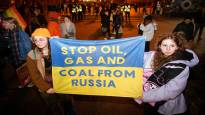The EU is preparing a new sanctions package against Russia, and as part of it, the export of Russian liquefied natural gas, i.e. LNG, to third countries through EU ports would be prohibited.
It tells about the content of the upcoming EU 14th sanctions package, among other things Politico.
So far, Brussels has banned the purchase of Russian coal, oil and oil products from Russia, but it has not previously touched Russian LNG. Even now, the EU is not pushing for a complete ban on LNG.
Without a complete ban, the impact is not great
Professor of economic and social history Jari Eloranta The University of Helsinki says in ‘s morning that there is no political will at the EU level to intervene in the entire LNG import ban.
The reason is that certain countries in Europe are still dependent on LNG. By countries, he refers to the countries found in Eastern Europe and large countries such as Spain.
That is why he estimates that the impact of the LNG ban alone would not be very large, but one stream among others.
– The whole package is very conservative or cautious.
Manager Petri Vuorio The Finnish Confederation of Business and Industry says that the value of LNG re-exports through the European Union is around a couple of billion euros per year. In total EU imports, on the other hand, it would be about eight billion.
However, Vuorio considers the EU’s initiative a justified first step and especially difficult for Finland to implement. Finland has even supported a complete ban.
EU countries have succeeded in reducing the use of Russian energy
EU countries have tried to get rid of Russian energy. According to Politico The EU has reduced its dependence on Russia for gas imports by about two-thirds since the full-scale Russian invasion.
Senior Advisor Laura Solanko The Bank of Finland tells morning that at the end of 2021, before the start of the Russian war of aggression, 40 percent of the gas used by the EU came from Russia.
– It was thought that this is the kind of dependence that the EU countries will never get rid of.
Last year, eight percent of the gas used by the EU came via pipeline from Russia, he continues.
– This shows that it is possible to take really dramatic actions in the EU.
According to Petri Vuorio, the Russian gas giant Gazprom’s recent earnings release, which showed a loss of 6.3 billion for last year, also tells about the collapse of gas imports.
– It was their first negative result in over 20 years. And the reason was this end of European gas exports.
In general, sanctions work, but they do not end war
Laura Solanko says that sanctions play a central role when trying to limit Russia’s ability to wage war.
According to Solango, it would be good to think that economic sanctions are an essential part of the whole package to respond to Russian aggression. Along with sanctions, there is also a need for diplomatic actions, non-governmental organization activities, and direct financial and material support to Ukraine, he says.
– What the sanctions achieve is that it is much harder and more difficult for Russia to get Western components and technology, which the Russian military industry needs, Solanko identified.
Russia has had to replace it with Chinese and Iranian technology.
According to the head of EK, Petri Vuorio, the sanctions have put a strain on the Russian economy.
– Although the sanctions unfortunately do not end the war, it still does not remove their importance, says Vuorio.
As an example of successful sanctions, Vuorio mentions sanctions in the financial sector.
– All over the world, a similar perception has arisen that if you break US sanctions, you will fall out of the dollar system.
The Russian economy is growing, but that does not tell the whole picture
Despite the sanctions, the Russian economy has continued to grow in terms of gross domestic product. According to Laura Solango, the background is that the state pumps money into the economy. Money is especially needed for war industry orders and army expenses.
– It is the biggest single explanation for the fact that the Russian economy is currently growing. It does not mean that the economy is actually doing well.
According to Solango, gross domestic product, which under normal circumstances correlates with well-being, is a bad indicator in an economy at war.
– The growth figures do not mean that the sanctions are in vain.
Jari Eloranta, professor of economic and social history, says that sanctions have had effects on the structures of the entire economy. According to him, Russia will have enormous challenges with the economy in the near future.
– Economic growth is such that it does not feed the future development of the Russian economy. Investments have been lacking for some time and will continue to be lacking in the future.
BOFIT, the Bank of Finland’s research institute for emerging economies, recently predicted that Russia’s economic growth is slowing down.
